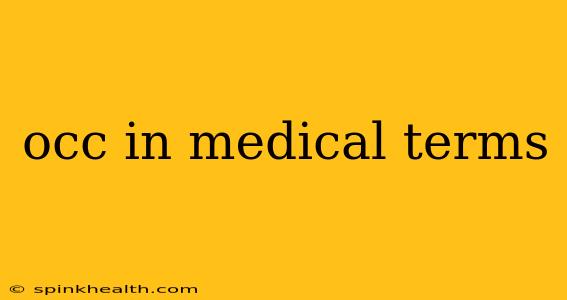The abbreviation "OCC" pops up in various medical contexts, often leaving patients and even some healthcare professionals scratching their heads. Let's unravel the mystery surrounding this seemingly simple three-letter code and explore its different meanings within the medical field. It's a journey that will take us from the eye to the brain, highlighting the importance of context in medical terminology.
What Does OCC Stand For in Medical Terms?
Unfortunately, there's no single definitive meaning for "OCC" in medicine. Its meaning depends heavily on the context in which it's used. This is a common challenge in medical shorthand, where brevity often necessitates ambiguity without the proper context. We'll explore some of the most prevalent interpretations below.
OCC: Occipital
One common interpretation of OCC in ophthalmology (the study of the eye) and neurology (the study of the nervous system) is occipital. The occipital lobe is a crucial area at the back of the brain responsible for processing visual information. Therefore, when encountering "OCC" in a neurological or ophthalmological report, it often refers to something related to the occipital lobe or the occipital region of the head.
For example, a note mentioning "OCC lesions" would likely indicate lesions (abnormalities) in the occipital lobe, potentially affecting vision. Similarly, "OCC pain" could signify a headache originating in the back of the head, potentially linked to tension, migraines, or even more serious neurological issues.
OCC: Occult
Another meaning of OCC in a medical setting is occult. This term describes something hidden, not readily apparent, or difficult to detect. For instance, "occult blood" in a stool sample indicates the presence of blood that's not visible to the naked eye, often a sign requiring further investigation to determine the underlying cause (e.g., internal bleeding). Similarly, "occult malignancy" refers to a cancer that has not yet been detected through routine screening or imaging, but whose presence is suspected due to other symptoms or indicators.
OCC: Other possibilities
While less common, OCC might represent other terms depending on the specific medical specialty and context. It is crucial to consult the full medical record or contact the healthcare provider to clarify the intended meaning.
Frequently Asked Questions (FAQ) About OCC in Medical Terminology
Here are some frequently asked questions surrounding the usage of OCC in medical contexts, based on common searches:
What does OCC mean in a medical record?
The meaning of "OCC" in a medical record is entirely dependent on the context. It could refer to "occipital" (related to the back of the head or occipital lobe of the brain), "occult" (hidden or not readily apparent), or even something else entirely. Always refer to the entire medical record or consult the healthcare professional who wrote the report for clarification.
What does OCC mean in ophthalmology?
In ophthalmology, "OCC" most commonly refers to "occipital," relating to the occipital lobe of the brain and its role in visual processing.
What does OCC mean in neurology?
Similarly to ophthalmology, in neurology, "OCC" typically stands for "occipital," designating the occipital lobe of the brain.
Is OCC a common medical abbreviation?
While not as ubiquitously used as some other medical abbreviations, "OCC" appears with enough frequency in specific fields like ophthalmology and neurology to warrant understanding its potential meanings. However, due to its ambiguity, it's crucial to confirm its meaning within the broader medical context.
Conclusion: Context is Key
The abbreviation "OCC" highlights the critical importance of context in medical terminology. Its meaning is not self-evident and requires careful consideration of the specific medical specialty and the surrounding information within the patient's record. When in doubt, always consult the relevant healthcare professional for accurate interpretation and clarification. This approach ensures patient safety and effective communication within the medical field.

